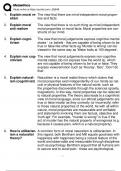Summary
Summary Metaethics - Moral Philosophy A Level Philosophy AQA
- Course
- Institution
- Book
Metaethics - Moral Philosophy A Level Philosophy AQA. From an A* student. Naturalism + Non-naturalism, cognitivism + non-cognitivism, prescriptivism, emotivism, etc. Can also provide access to digital quizlet flashcards if asked.
[Show more]




